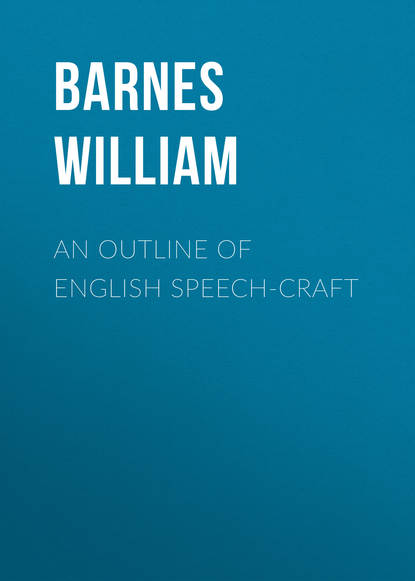По всем вопросам обращайтесь на: info@litportal.ru
(©) 2003-2024.
✖
An Outline of English Speech-craft
Настройки чтения
Размер шрифта
Высота строк
Поля
Unhappily two sundry endings of the old English have worn into one shape. They were -ung or -ing and -end.
Singung is the deed of singing, a thing. Singend is a mark-word, as in the wording ‘I have a singing bird.’
Sailing and hunting, in the foregiven thought-wordings, are thing-names, and not mark-words. Sailing is segling, as ‘ne mid seglinge ne mid rownesse’ (neither with sailing nor rowing). – Bede 5, 1.
‘Wunigende ofer hyne’ (woning [mark-word] over him). – Matt iii. 16.
‘Sy wunung heora on west’ (be their woning [thing-name] waste). – Ps. lxviii 30.
‘Ða genealaehton hym to Farisaer hyne costigende’ (then came near to him the Pharisees tempting [mark-word] him). – Matt xix. 3.
‘Ne gelaede þu us on costnunge’ (lead us not into tempting [thing-name]). – Lord’s Prayer.
So ‘haelende,’ Matt v. 23; ‘haeling’; ‘bodigende,’ Matt. x. 35; ‘bodung,’ Luke xi. 32.
‘Waere þu to-daeg, on huntunge?’ (not huntende) (wert thou to-day on or in hunting?) – Aelfric’s Dialogue.
‘Hwaet dest þu be þinre huntunge?’ (not huntende) (what dost thou by thy hunting?) – Aelfric.
‘The CALLING of assemblies I cannot away with.’ – Isa. i. 13. Not ‘calling assemblies,’ which, if calling were a mark-word, would mean assemblies that call.
The right speech-trimming with the thing-names in -ing is to trim them in the old English way as thing-names in their cases; as,
‘We are the offscouring of all things unto this day.’ – 1 Cor. iv. 13. Not ‘We are the offscouring all things.’
‘For that righteous man, IN seeing and hearing, vexed his righteous soul.’
‘By the WASHING of regeneration and (the) RENEWING of the Holy Ghost.’ – Titus iii. 5. Not ‘He saved us by the washing regeneration and renewing the Holy Ghost.’
The ending -er of the time-taker (deeder, name-word) is, not unclearly, the Celtic, Welsh gwr, or in word-welding -wr, the Latin -or; as,
Welsh, barn, doom; barnwr, a doom-man.
Latin, canto, to sing; cantor, a sing-man.
Thence -er seems a far less fitting ending for a tool-name than the old Saxon -el; and a tool for the whetting of knives would be more fitly called a whettel than a whetter. Choppel, chopper; clippels, clippers.
All new time-words now taken or shapen from other tongues must be unmoulded.
We say shoot, shot (not shooted); but loot, looted (not lot), loot being the Hindustani lootna, to rob or plunder.
So time-words, which are known English words, of another kind, names or mark-words, are mostly unmoulded.
The shapening of the time-words hangs rather more on their endings than on their headings.
The oddest are those which end in the throat-pennings —NG, NK, K, G; and those ending in roof-pennings —T, D.
Because the -d of the roof-penning -ed is so unlike a throat-penning, which cannot easily stand with it: and because the T and D are like d as roof-pennings, and (see Table) they may run into them.
-ING Root-words (strong)
The wording of a time-taking (predicate) with its speech-thing (subject) is a Thought-wording (proposition).
Strong or moulded time-words are such as, for a time-taking of foretime, are moulded (without any out-eking) into another shape or sound, as
The weak or unmoulded time-words take on, unmoulded, an ending such as -ed, as
All time-words that are known names of things are unmoulded, as
Very many of our time-words are unmoulded from the same cause – that they are names of things; although such names of things, having become worn more or less out of shape, or having fallen out of use, may not show themselves to our minds what they are.
To hunt makes hunted; why? From hound, to hunt, meaning at first to seek with a hound.
It may, however, be said, ‘Is to hunt from hound, or hound from to hunt?’
Such a point is, in very many cases, cleared out by the Anglo-Saxon, in which ‘to hunt’ is hunt-i-an, not hunt-an; and the i, a worn shape of ig, shows that huntian is from hund, hound, and so hound is not from hunt.
The time-word from the thing hunt-ig-an, hunt-i-an, is to houndy, to take time with a hound.
We say
But we should say ‘he ringed (not rung) his pig’; ‘he stringed his harp’; ring and string being things.
The strong or moulded time-words are nearly or quite all words ending in one single breath-penning, and of a close sound (1, 2, 3, or 4 of the Table), as
Other time-words, name-words, or stem-words, and broad-sounded ones (5, 6, 7, 8 of the Table), are nearly all weak or unmoulded.
Weak.
The ending -NG in broad-sounded words —
-NK, Broad.
And in
-K, Broad, Long Stem-words (weak).
Make was heretofore maked:
‘For aevric rice man his castles makede.’ – Sax. Chron. MCXXXVI.
K wore out, whence
Maked, ma-ed, maed, made.
-K, Short.
-G, Short.





